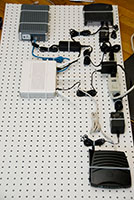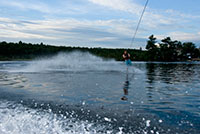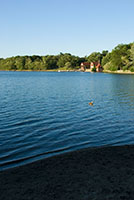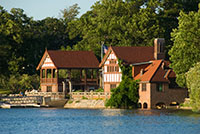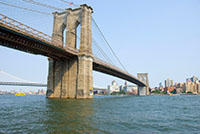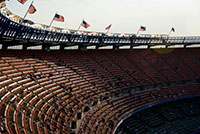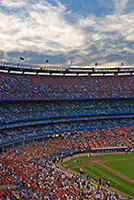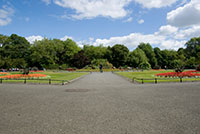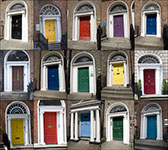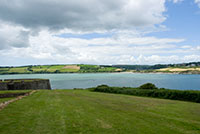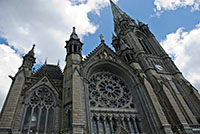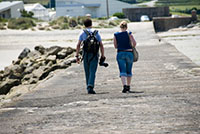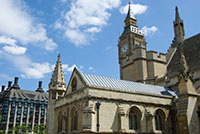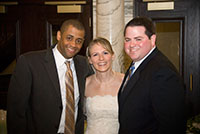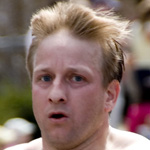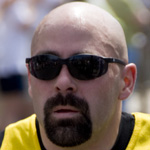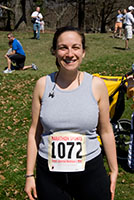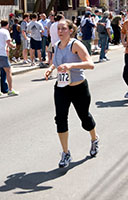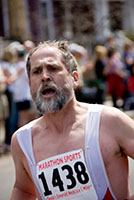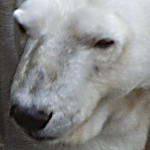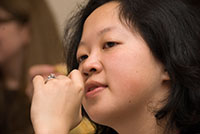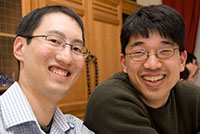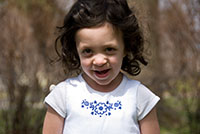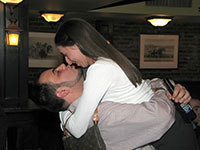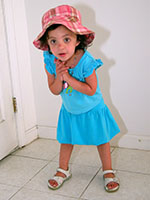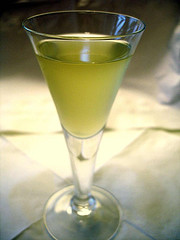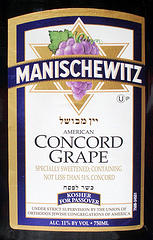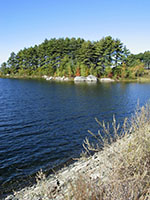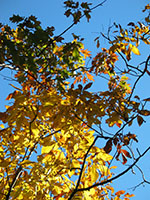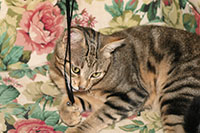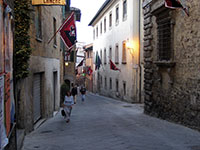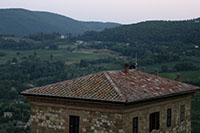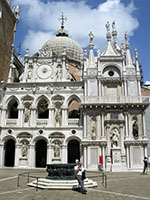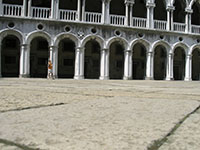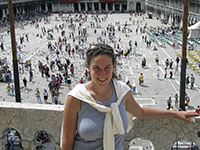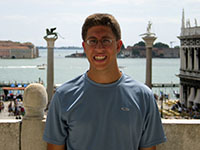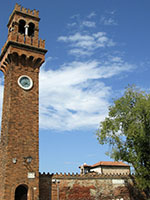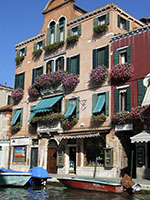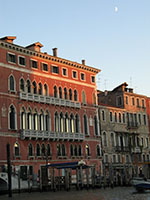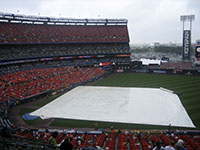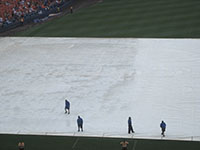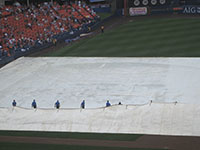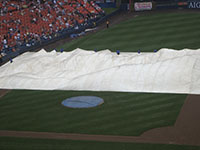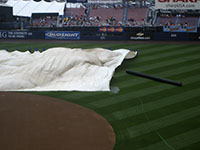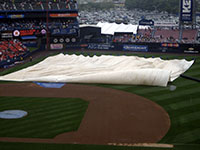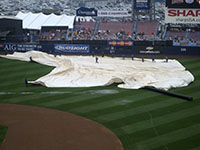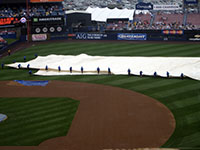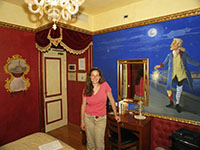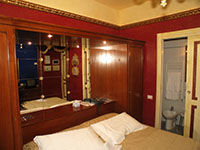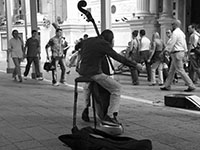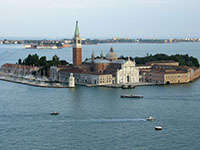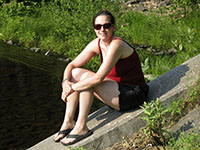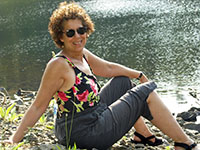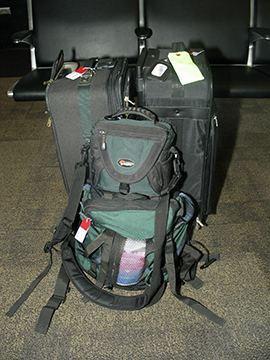(If you haven't already, check out Day 4 before reading this entry.)
Siena: A Medieval Masterpiece
We awoke on Sunday morning to find a beautiful Tuscan day awaiting us outside. Perhaps this is an appropriate time to mention the weather. We vacationed in Italy during the middle of August. Everyone (ranging from the real people that you talk to in real life to the authors of travel guides to all those imaginary people who exist only inside my computer) agrees that August is the worst time to travel in Italy. Tourist attractions are crowded, prices are high, and popular restaurants and shops are closed while their Italian owners take their holiday. And perhaps worst of all, the heat can be oppressive. Time and time again we were promised hot, humid, and even stormy days. Circumstances being what they were, we rolled the dice and took our chances in August. And...
Attractions were crowded, yes. Some restaurants we wished to visit (especially in Rome) were closed, yes. But the weather! Were I but a mediocre poet during the days of the Roman Republic I would devote my days to composing odes to the magnificence of the weather in Italy from August 11 to August 28, 2005. Day after day, the skies were blue with fluffy clouds. The sun shined, but the temperature never climbed beyond the mid-80s. We only saw rain on two of our eighteen days, and then only for two hours or less. Bright and warm daytimes regularly gave way to clear and comfortable evenings. Beautiful.
A Pit Stop at Pienza
We planned to spend most of Sunday visiting Siena and witnessing a trial run of Il Palio. (More on Il Palio below.) We managed to get off to a decently early start and, with Lynn driving and me navigating, headed off west and then north along twisting Tuscan roads towards Siena. As we were still working on empty stomachs, we took advantage of the signed turnoff towards Pienza to spend a short while investigating the nearby hill town.
After a brief stop to take pictures of the surrounding landscape and the proverbial-but-oh-so-accurate city on a hill, we drove up to Pienza. Finding parking near the centro storico proved to be difficult, so we drove about half a mile down the road and walked back towards the old part of town. We were intending primarily to grab a bite to eat in Pienza, but almost immediately after walking through Pienza's gates, we were drawn to Pienza's main square, Piazza Pio II. We took in the classic Renaissance architecture of the Palazzo Pubblico and Pienza's Duomo, both constructed in the fifteenth century when Pope Pio II (Piccolomini) had his birth town recast in his honor and towards his vision of a città ideale. From there, it wasn't long until we wandered off to the right of the piazza, where a street to the side of the Duomo's bell tower offers vast vistas of the Tuscan countryside below.
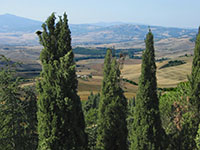
We ate breakfast at Dolce Sosta, a pasticceria along Pienza's main way. We bought at the bar and—after making sure that pasticceria didn't mind—sat at a small table in the back while enjoying our food: a pasta (pastry) and a cappuccino for Lynn and a pasta and orange juice for me. Even in the height of the tourist season, we were very pleased to discover that the small bars and caffés seemed to be filled with local residents going about their day-to-dayy activities rather than mobs of visitors. Authenticity is in the eye of the beholder while traveling, I suppose, but we enjoyed our chances to sample small slices of Italian life.
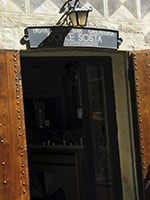
Following breakfast, we walked along Pienza's main street and ducked into one of the many shops selling fresh pecorino cheese. We purchased a block of cheese, and I unwisely answered in the affirmative when asked if we'd like the cheese to be vacuum sealed. Do you know how difficult it is to undo a package of vacuum-sealed pecorino cheese with no scissors and no knife? We didn't know either, until a bit later that day in Siena.
To Siena
After one more look at Pienza's Duomo and the landscape beyond, we headed back to our car and resumed our trip north towards Siena. I had trouble helping Lynn navigate the signs along the way as my eyes were constantly drawn to the breathtaking and picture-postcard quality landscapes through which we were driving. We did stop once during the hour ride to Siena to fill up the car's gas tank. The gas station we chose was fully automated, and when we found ourselves with no cash other than 50 euro notes, I remembered that I had read a bit about Italian gas stations in my research beforehand. The advice that I had printed out from SlowTrav indicated that self-service stations in Italy do not give change. As we did not need nearly 50 euros worth of diesel and could not find a likely spot on the pump that would dispense change, we decided not to experiment with the accuracy of the SlowTrav advice, and so we pressed on.
As we neared Siena, the next quesiton was where to park. I'd done a fair amount of research on this question as well, and (once again primarily due to SlowTrav advice), we decided to follow the signs for P. Il Campo. This led us to a large garage much nearer to the center of the city then some other parking options we passed along the way. Highly recommended to anyone approaching Siena from the south.
Leaving the garage we headed towards the center of the city and Il Campo, and we immediately were taken with the narrow, bustling streets, the hilly terrain (as with Rome, Siena was built on several hills), and most of all the bright flags of Siena's seventeen contrade (neighborhoods). Sienese residents are loyal first and foremost to their contrada, and this loyalty reaches a head twice a summer during Il Palio, a manic horse race around Siena's central Piazza del Campo (Il Campo). We'd timed our visit to Siena to coincide with one of the several trial runs of Il Palio that take place in the days leading up to the actual race. We arrived at Siena a bit before noon and the trial race would occur at seven in the evening; this left us with seven hours to experience and learn what we could about the history, the art and architecture, and the people of Siena to better appreciate what we'd see that evening.
Il Campo and Beyond
In its history, Siena and the smaller towns around it were often involved in a bitter rivalry with Florence to the north. At different times, this rivalry took the form of disputes over religion, politics, architectural superiority, and, of course, direct military conflicts. Siena reached the height of its power in this back-and-forth struggle during the late medieval period (13th and early 14th centuries), but any further hopes of glory were dashed when the Black Death took the lives of almost half of Siena's population in 1348. While Florence would emerge as Italy's great center of Renaissance art and architecture, Siena remained frozen in time, its art and its architecture a testimony to the devastation of the plague.
To begin, we headed to Il Campo to orient ourselves. We saw the packed sand track encircling the shell-shaped piazza and the throngs of tourists milling about and dining at the cafe tables set out on the sand. Heading a block or two away from Il Campo, we came across a street vendor selling inexpensive and brightly colored wares. After a bit of bargaining, Lynn purchased a lightweight, woven red scarf and an over-the-shoulder baby blue bag. The bag would become a favorite over the course of the rest of our vacation, and once we returned to the States it would earn its own remarkable story.
Wandering through various contrade, we visited a small and crowded alimentari and purchased some salame, a loaf of bread, and a bottle of water (mistakenly acqua frizzante, much to my chagrin) to go along with the pecorino that we had bought that morning in Pienza. Leisurely walking several more blocks through the neighborhoods of Siena, we came to a small opening dominated by a beautiful church. We thought at first that we might have stumbled upon Siena's famed Duomo, but we soon realized that the church was "just" the cathedral for one of Siena's contrade. A truly gorgeous church, and it was but one of seventeen neighborhood chiese in the city! (When we figured out that this was a contrada church, it reminded me that I had read that on the day of Il Palio, each contrada brings its horse to its local church to be blessed before the race.) We joined a score of other people relaxing on the steps outside the chuch, and set about opening up the vacuum-sealed cheese. Via a combination of our Sant' Antonio key, Lynn's teeth, and pure, unbridled desire, we managed to free the delicious cheese and were able to eat one of the many incredibly satisfying bread, meat, and cheese meals that we would share while in Italy.
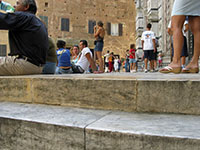
Il Duomo di Siena: Ambition or Hubris?
After lunch, we walked a short distance up the street to Siena's Duomo. The white and dark-green striped marble Gothic cathedral was constructed during the thirteenth century and dominates the crest of one of Siena's hills. Yet in the ongoing struggle for cultural, religious, and political dominance in the region, the Sienese wanted to worship in the largest and most grand cathedral of any in the region. They planned and began construction of a Nuovo Duomo which would be so large that the nave (long, center aisle) of the existing cathedral would be the transept (cross-piece) of the new cathedral! The Sienese began by building the facade of their magnificent new Cathedral in 1339, but the arrival of the plague less than a decade later halted all constructon efforts, and the largest cathedral in Tuscany was never completed.
Today, the base of the facade of the unfinished cathedral hosts the Museo dell'Opera Metropolitana. The museum boasts an impressive collection of Pisano sculptures and paintings and tapestries from a variety of Italian artists. We spent our time admiring the art as we worked our way through the four floors of the museum, and then we headed up a set of stairways to the glorious panoramic view of Siena from the top of the Nuovo Duomo facade. We lingered atop the tower for a while, enjoying the summer breeze and the views of Il Campo, the Tuscan landscape, and Siena's neighborhoods. After perhaps twenty minutes of relaxing and enjoying the view, we headed back down and got on line to enter Il Duomo.
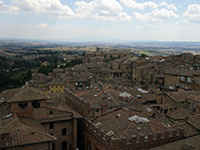
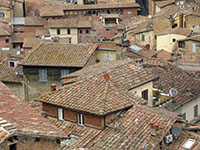
The line to enter Il Duomo took perhaps fifteen minutes, and once inside we enjoyed the dark marble environments. It was crowded inside the church though, and it was difficult to spend much time admiring the specific artwork contained within. Our favorite part inside the cathedral was the line of sculpted popes' heads running from column to column and staring down at the visitor who happened to glance skywards:

We strolled back to Il Campo where we grabbed some water and soda and a break from the hot sun while watching a man begin to hose down the sand track surrounding the piazza. Next, we trekked uphill towards the northwest part of town. Along the way, we caught our first glimpses of the children of several of the contrade dressed in the colors of their contrade and marching through the streets while chanting, singing, and carrying candles. The atmosphere was at once both festive and combative, and we could feel a small bit of the importance surrounding Il Palio as tourists and residents alike stopped in their tracks to watch the contrada children go by.
Further away from the center of the city, we came to the Dominican church dedicated to the worship of Saint Catherine of Siena. Far simpler than many of the other cathedrals and basilicas that we'd seen so far on our travels, the Chiesa di San Domenico nevertheless is a beautiful chuch that houses beautiful artwork. Inspired by the surroundings, Lynn and I passed a while inside the church sharing philosophies of life, religion, and death. Outside again, we indulged in the acrobatics of some Italians on the nearby grass, and also drank deeply of the dramatic view across town to Il Duomo.
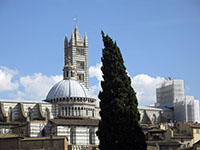
Il Palio
Walking back from the Chiesa di San Domenico, we share a cone of vaniglia gelato and ducked into a small store to buy some breakfast bars for Lynn for the rest of the week. We still had about two hours left before the trial run of Il Palio, and skimming through one of our guide books we saw that a cinema in P. Tolomei features a 20-minute film on Il Palio. We headed over to P. Tolomei, but found the cinema closed during the days leading up to race day. Alas, all was not lost as we got to take in another delightful contrada chiesa and see the children of yet another contrada parading through the streets. With that, we headed back to Il Campo.
When we arrived, one-third of the shell-shaped piazza had fallen into shade, and that third was already beginning to fill with tourists and residents awaiting the trial run of Il Palio. Lynn and I staked out a position directly on the inner rail of the track and sat down to wait. Our spot was still bathed in sunlight when we began waiting, but it was strategically chosen as to be quickly to fall into shade as we waited for the race. And so the minutes passed, and Il Campo filled. Slowly at first, and then more and more quickly as the time of the trial run approached. Residents of the contrade began to fill the (high-priced) seating ringing the outside of the track, and other Sienese residents appeared on balconies around the piazza. With forty minutes still remaining before the Palio trial race, most of Il Campo was filled. With twenty minutes to go, Sienese police cleared the track of stragglers, and they were followed by a cleaning crew removing debris and smoothing the sand. As race time rapidly gew near, members of opposiing contrade exchanged taunts and songs and cheers and jeers from one section of the stands to the next.
The race began, and we were pressed against the rail as the crowd strained for a close view of the thrills of the two-minute race. The jockeys, decked out in the bright colors of the contrade they represent, spurred their horses around the track once, twice, three times. The horses careened around, digging against the slope of the track take the curves as tightly as possible. And in the end, there was excitement, there was celebration, and we had no idea which contrada won the trial run. But somehow—;for us, at least—the winner didn't seem to matter at all. It was being there—even for just a trial race—that counted.
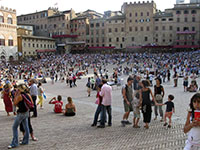
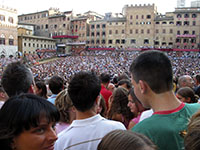
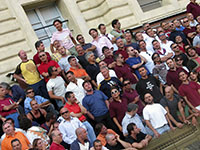
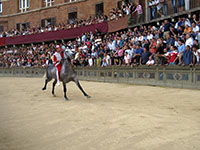
A Quiet Evening
As the tidal wave of spectators receded from Il Campo, we made our way back to the parking garage, paid (about 12 euros) for our parking, and got on the road south back towards Montepulciano. As we had broken our 50 euro notes into smaller denominations during our day at Siena, we pulled off the road to fill up our gas tank on the way back. Lynn pulled up to the pump and I got out to pay for the gas and use the pump. We realized that the car's gas tank was on the other side of the car, and so Lynn started maneuvering the car to turn it around so that the gas tank faced the pump. Meanwhile, an elderly Italian man had pulled up to another pump. As he saw Lynn pulling off a many-pointed U-turn to re-align the car with the gas pump, he gave me a big smile and engaged me in conversation. Despite the fact that I didn't understand a single word that the man said beyond buona serra, it was still perfectly clear to me that he and I were having a blast of a time teasing my wife as she struggled to reposition the car. The words didn't matter one bit; the smiles, hand gestures, and laughs coalesced into a very friendly and entertaining conversation.
As it was only around 8:30pm as we neared Montepulciano, we decided to postpone dinner a bit longer and swing by the Chiesa di San Biagio just outside the old city walls. The Renaissance church was striking in the moonlight, and while we couldn't go in at the late hour, we strolled around and admired the church from all angles. Finally, we headed towards Sant' Antonio and stopped at the restaurant Il Covo di Obelix which Nico from Sant' Antonio had recommended for casual dining. Dinner was fantastic: caprese, carpaccio, pizza margherita, tiramisu, and, of course, vino.
Exhausted from our day out, we retired to our apartment at Sant' Antonio and slept very well indeed.
Next time: relaxation, and we travel east where Lee falls in love with a town; also, sagra della bistecca in Cortona!
Please enjoy all of the pictures from our fourth day in Italy in my photo album.

